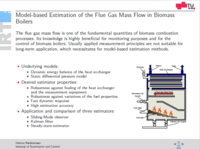Research projects
The Institute of Automation and Control engages in research across a range of exciting fields, aiming to advance the modeling, optimization, and control of complex systems. Below is a selection of our latest research topics:
|
Discrete-time Design of Adaptive Sliding-Mode Control Sliding-mode techniques have proved to be advantageous when considering systems with uncertainties. However, the discrete-time implementation of sliding-mode control introduces new problems like discretization-chattering ... |
 |
|
|
|
|
Robust Control of Networked Systems: Buffering, Control Design and State Estimation Networked control systems face several challenges, including uncertain delays, data loss, and out-of-order packet arrivals, which complicate stability and performance. Ensuring reliable operation under such conditions requires computationally intensive control strategies ... |
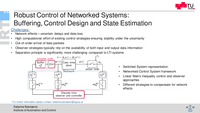 |
|
|
|
|
Robust Feedback Loop Design for Distributed Parameter Systems The vast majority of research in the area of control engineering deals with systems which are typically modelled by ordinary differential equations. While these systems cover a wide range of physical phenomena, there remain many processes which require modelling via partial differential equations. Extending existing (robust) control schemes to these so-called distributed parameter systems and dealing with the increased mathematical complexity pose interesting challenges in this research field. |
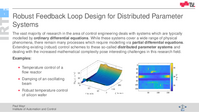 |
|
|
|
|
Optimal Control for Networked Control Systems Networked control systems where controllers, actuators, and sensors are connected via networks come with many advantages but also with new challenges compared to classical control strategies ... |
 |
|
|
|
|
Stability Criteria for Networked Control Systems With Packetized Transmissions Stability criteria for networked control systems with packetized transmissions, accounting for time-varying delays, packet overtaking, and receiver-side mechanisms like packet skipping and hold. Small gain theorem-based stability conditions are proposed, incorporating these factors, unlike traditional LMI-based methods ... |
 |
|
|
|
|
Robust Internal model-based control One of the major challenges in controlling dynamic systems is dealing with external disturbances and uncertainties. Following the so-called Internal Model-Based control (IMC) concept, a dynamic model, the so-called exosystem, could be used to approximate the time behavior of the external disturbances ... |
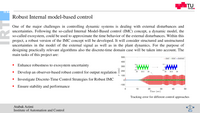 |
|
|
|
|
Real Time Optimization in Continuous Pharmaceutical Manufacturing System identification techniques are used to develop models of the considered processes, which are used in RTO frameworks |
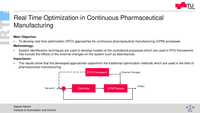 |
|
|
|
|
Advanced control of chemical processes Advanced control of chemical processes involves using physics-based, data-driven or hybrid models to optimize and stabilize reaction dynamics, particularly in modular reactor setups. This approach enables multi-objective optimization, identifying optimal operating points and reactor configurations for efficient flow chemistry and reaction management ... |
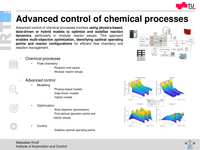 |
|
|
|
|
Model-based Control and Estimation of Sustainable Bioprocesses Cupriavidus necator , also known as the knallgas bacterium”, has been extensively studied due to its versatile use in industrial microbiology. During its growth, Cupriavidus necator can make use of gases such as carbon dioxide and produce useful side products ... |
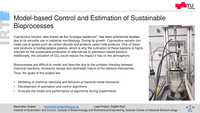 |
|
|
|
|
Model-based strategy for optimizing biopharma processes This research focuses on optimizing biopharmaceutical processes through model-based strategies, using a fed-batch bioreactor case study. Key innovations include developing a digital twin, implementing real-time algorithms for process control and fault detection, and integrating human-in the-loop systems to support operator decisions. |
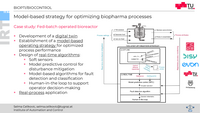 |
|
|
|
|
Strategy for digital real-time release testing (RTRT) in pharmaceutical production This research develops a digital real-time release testing (RTRT) strategy for pharmaceutical production, focusing on continuous tableting processes. It features process monitoring frameworks with PAT tools, RTD models for material tracking, and advanced algorithms to align process data with product characteristics, ensuring comprehensive quality assessment at the single-tablet level. |
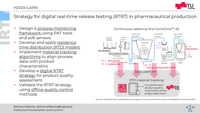 |
|
|
|
|
Enabling Tomorrow‘s Mobility: Control Strategies for Test Beds Tomorrow’s mobility depends on today’s research on fuel cells, batteries, power electronics, and electrical machines. Such research, in turn, requires capable and accurate test beds. The control of these test beds is both challenging and fascinating ... |
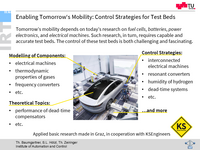 |
|
|
|
|
Modelling and Control of Resonant Converters DC-Power Grids are becoming increasingly important. In contrast to AC-grids, galvanic isolation cannot be achieved by using transformers solely. One method to overcome this problem is using resonant converters ...
|
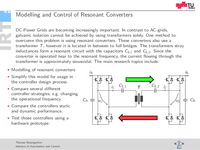 |
|
|
|
|
Embedded Optimization for Automotive Applications In the automotive industry, control problem statements can be addressed using optimization-based strategies, which are powerful techniques for achieving specific control objectives while considering the system’s dynamics and constraints. However, solving optimization problems in real-time applications requires a significant amount of computational power ...
|
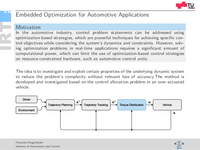 |
|
|
|
|
Integration of data-driven approaches into classical control techniques Data-driven methods in control systems have garnered significant attention, leveraging historical data to analyze system dynamics, make predictions, and optimize control strategies In contrast, classical control techniques rely on mathematical models ... |
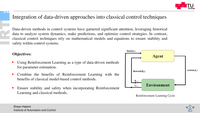 |
|
Graves’ disease is one of the most common causes of hyperthyroidism and has a lifetime risk of 3% for women and of 0.5% for men. In this project model-based methimazole dosing strategies are designed and investigated ... |
 |
|
|
|
|
Automatic Levothyroxine Dosing Algorithm for Patients Suffering from Hashimoto‘s Thyroiditis Hashimoto's thyroiditis is the primary cause of hypothyroidism, resulting in insufficient thyroid hormone |
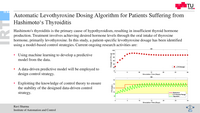 |
|
|
|
|
Modelling and Control of Transformers To prevent expensive damages to the electrical power grid infrastructure, the installed transformers need to be tested regularly by measuring the important transformer characteristics. The difficulty of this project is linked to the large variety of different transformer found in the field ... |
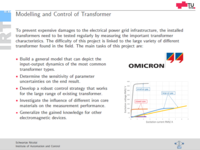 |
You can also find previous research projects listed below.
Institute of Automation and Control
Graz University of Technology
Inffeldgasse 21/B
8010 Graz
Tel.: +43 (0) 316 / 873 - 7021
Fax: +43 (0) 316 / 873 - 7028


